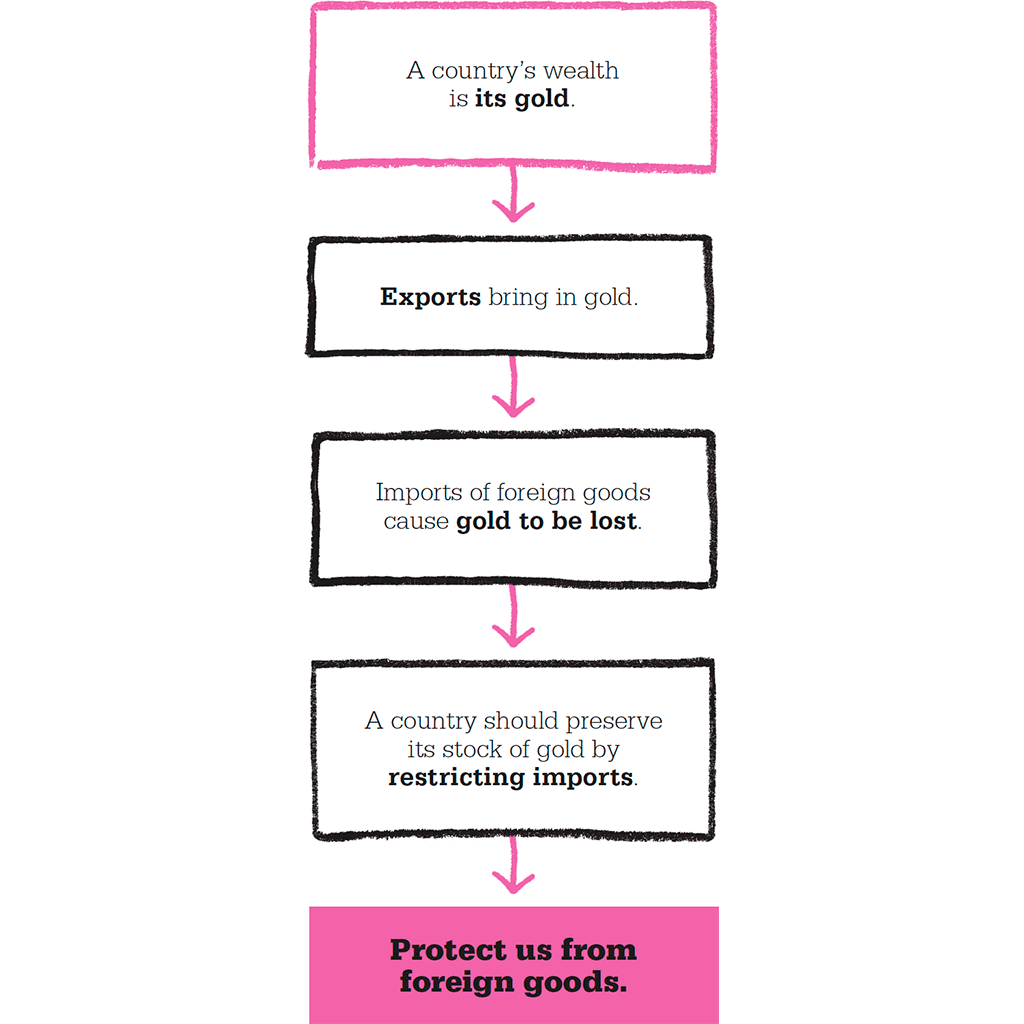

Global economy
Thomas Mun (1571–1641)
c.1620 Gerard de Malynes argues that England should regulate foreign exchange to stop the nation’s gold and silver from going abroad.
1691 English merchant Dudley North argues that the main spur to increased national wealth is consumption.
1791 US Treasury Secretary Alexander Hamilton argues for protection of young industries.
1817 British economist David Ricardo argues that foreign trade can benefit all nations.
1970s US economist Milton Friedman insists that free trade helps developing countries.
For the last half century many economists have championed free trade. They argue that only by removing restrictions on trade (such as tariffs) can goods and money flow freely around the world and global markets develop without inhibition. Some disagree, arguing that where there is a huge imbalance of trade between two countries, it can impact jobs and wealth.

The argument over free trade dates back to the mercantilist era, which began in Europe in the 16th century and continued until the late 18th century. With the rise of Dutch and English seaborne trade, wealth began to shift from southern Europe toward the north.
This was also the age when nation-states began to emerge, along with the idea of the wealth of the nation, which was measured by the amount of “treasure” (gold and silver) it possessed. Mercantilists believed that the world drew from a “limited pot,” so the wealth of each nation depended on ensuring a favorable “balance of trade,” in which more gold flows into the nation than out. If an excess of gold flows out, the nation’s prosperity declines, wages fall, and jobs are lost. England sought to cut the outflow of gold by imposing sumptuary laws, which aimed to limit the consumption of foreign goods. For instance, laws were passed restricting the types of fabric that could be used for clothes, reducing the demand for fine foreign cotton and silk.

French farmers demonstrated on tractors in Paris, 2010, to denounce a sharp fall in grain prices after import quotas were liberalized.
Gerard de Malynes (1586–1641), an English expert on foreign exchange, believed that the outflow of gold should be restricted. If too much flowed out, he argued, the value of English currency would fall.
However, the century’s greatest mercantilist theorist, Englishman Thomas Mun, insisted that what matters is not the fact that payments are made abroad, but how trade and payments finally balance out. Mun wanted to boost exports and cut imports through more frugal consumption of domestic produce. However, he saw no problem in spending gold abroad if it was used to acquire goods that were then reexported for a larger sum, ultimately returning more gold to the country than had initially been spent. This would boost trade, provide work for the shipping industry, and increase England’s treasure.
In the 18th century Adam Smith was to disagree with this view. What matters, he insisted in The Wealth of Nations, is not the wealth of individual nations but the wealth of all nations. Nor is the pot fixed; it can grow over time—but only if trade between nations is unrestricted. If left free, Smith insisted, the market would always grow to enrich all countries eventually.
For the last half century Smith’s view has dominated, because most Western economists argue that restrictions on trade between nations hobble their economies. Today, free trade areas such as the EU (European Union), ASEAN (Association of Southeast Asian Nations), and NAFTA (North American Free Trade Agreement) are the norm, while global organizations such as the World Trade Organization (WTO) and the International Monetary Fund (IMF) urge countries to reduce tariffs and other trade barriers to allow foreign firms to enter their domestic markets. The creation of barriers to foreign trade is criticized now as protectionism.
However, some economists are concerned that exposure to large global businesses has the potential to damage developing countries who are unable to nurture infant industries behind protective barriers, as the US, Britain, Japan, and South Korea did before they became economically powerful. China, meanwhile, pursues a trade policy that in many ways echoes Mun’s thinking by running large trade surpluses and building up a huge reserve of foreign exchange.
Born in 1571, Thomas Mun grew up in a family of wealthy London merchants. His father died when he was three, and his mother married Thomas Cordell, who became a director of the East India Company, Britain’s largest trading company. Mun began trading as a merchant in the Mediterranean. In 1615, he became a director of the East India Company. His ideas were developed originally to defend the company’s export of large amounts of silver, on the grounds that this generated reexport trade. In 1628, the company appealed to the British government to protect their trade against Dutch competition. Mun represented their case to Parliament. He had amassed a considerable fortune by the time he died in 1641.
1621 A Discourse of Trade
c.1630 England’s Treasure by Foreign Trade